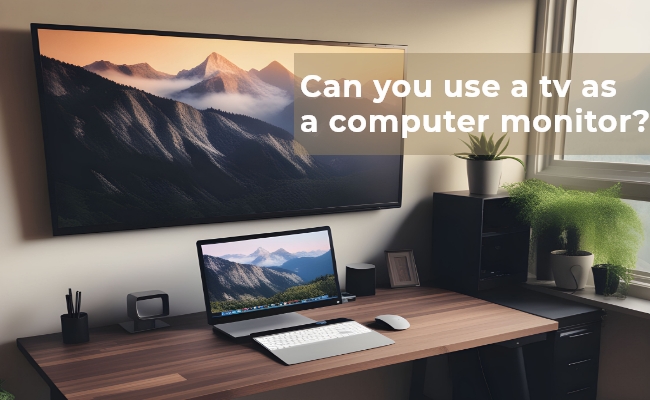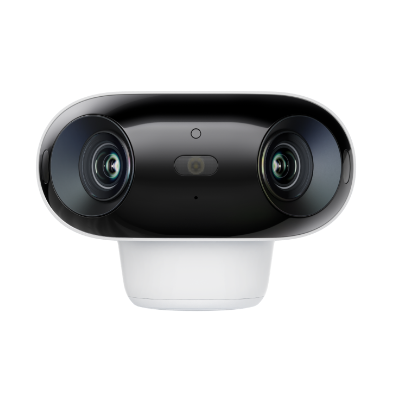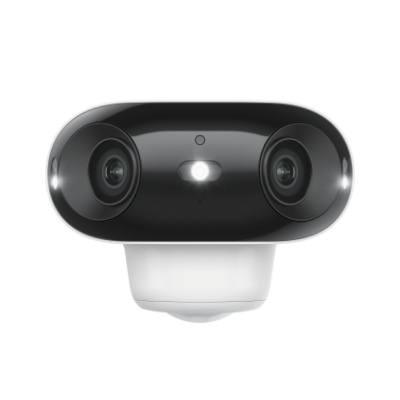Can You Use a TV as a Computer Monitor?

Computer users often think about replacing their monitors with a large TV. But the question is: Can You Use a TV as a Computer Monitor?
In this article, we will answer whether you can use a TV as a computer monitor or not. We will explain how you can do that and the things you need to consider while selecting the TV. We will also unveil the scenarios when you can use a TV and when a monitor works better.
Can You Use a TV as a Computer Monitor?
Yes, you can use a TV as a computer monitor. The display will be much larger and more visible. You can open multiple windows at the same time, watch videos of CCTV cameras, etc.
However, both computer monitors and TVs are made for different purposes.
If you want a large screen at an affordable price and you don’t care much about the refresh rate and lag, you can go with a TV. It will be much cheaper than computer monitors of the same size.
But if visual experience, including lag and refresh rate, matters a lot, the best option would be using a computer monitor.
How to Use TV as a Computer Monitor?
Here are the simple steps you need to follow. All you need for this is an HDMI-to-HDMI cable. And make sure both the computer and TV have HDMI ports.
- Connect the male HDMI connector to the female connector of your computer.
- Connect other male HDMI connected to the TV.
- On your TV, select the input source as HDMI. Use the TV remote to adjust the input settings.
- On your computer, go to Settings > System > Display.
- Go to the Multiple Displays section and click Detect. It will automatically detect your TV. Select it.
- Finally, adjust the resolution according to the TV. You are ready to enjoy it.
What to Consider When Using TV as a Monitor?
If you want the best experience of using a TV as a monitor, consider the following factors.
Input Lag
Input lag refers to the delay caused when you give input through input devices, such as a keyboard or mouse. You might notice a delay in the movement of your mouse cursor or click.
If the lag is significant, it could ruin your experience. And you won’t be able to use it for gaming and fast processing.
It is recommended to check the input lag of the TV. It should be less than 30 milliseconds for a good experience.
Refresh Rate
Refresh rate is the most important factor for gamers, graphic designers, and streamers. It represents the number of times the display refreshes. The more the value, the better it is to have an immersive experience without missing any frame.
You can go with a 60Hz or higher refresh rate. It is available on TVs, and you will be able to enjoy gaming to the fullest.
Connection Options
The preferred way to connect a TV to a computer is HDMI. So make sure the TV has an HDMI port. It is better to have multiple ports on it. Similarly, there should be an HDMI port on your computer.
If there is no HDMI port, you will have to use an adapter. It works, but a direct connection is better.
Size and Viewing Distance
You also need to know the relationship between size and viewing distance.
TVs are designed to watch from a considerable distance. You can’t place them directly on your computer table like a monitor. It is better if the viewing distance is more than a meter. Select the size according to the distance. For a larger distance, you need a large TV.
Also, pay attention to the resolution. But keep in mind even if the resolution of a TV and monitor is the same, you will experience a big difference in the visual quality. The size of the TV is large, so the pixels are spread over a large area. That said, the pixel density is less. You need to get a high pixel density in TVs, and for that, you need to go with a high resolution, such as 4K.
Response Time
Response time is the time required by pixels to change the color. It affects the visual quality and experience. Usually, the response time of TVs is longer than monitors. Select a TV that offers minimal response time.
Is it Worth to Use TV as Monitor?
It depends on the application. If you want to switch to a TV to enjoy a large screen for watching movies, CCTV camera monitoring, and low-processing tasks, you can go with a TV. It works fine and offers a better experience on a large screen.
But if you want to enjoy gaming, graphics, and high-processing tasks, it is not worth it. Monitors are much better than TVs in terms of input lag, refresh rate, and response time.
Practical Applications of Using TV as Monitor
Gaming
TV screens are also used for gaming but not for high-end games that require extreme refresh rates and minimal input lag.
They are suitable for low-level or mid-level gaming. Consoles, such as Xbox and PlayStation, are also connected to TVs to enjoy an immersive experience on a large screen.
Multimedia and Entertainment
The most common use of a TV in place of a monitor is multimedia and entertainment. Due to a larger display, you can watch movies, songs, and other things to the fullest. You can watch from a distance along with your friends and family.
Productivity and Work Tasks
For multiple tasks and increasing productivity, you need a larger screen. On a TV, you can easily open multiple windows and see each of them clearly at the same time. There is enough space on the desktop.
Collaborative and Presentation Purposes
TVs are connected to computers for presentation purposes. A presentation is more visible on a larger screen. It is an ideal option for meetings and collaboration.
Security Monitoring
Integrate security camera feeds into your TV for real-time monitoring of your home or office premises.
With the Reolink Argus 4 Pro, this process becomes seamless and efficient. Offering unmatched 4K Ultra HD resolution and advanced ColorX Technology, the Argus 4 Pro delivers clear and detailed video footage, even in low-light conditions. Its wireless design and easy installation make it effortless to set up and integrate with your TV, providing instant access to live camera feeds from anywhere.
4k 180° Wire-free Color Night Vision Camera
4K UHD 180° Blindspot-free View; Color Vision Day and Night; 30% More Battery Life; Dual-band Wi-Fi 6; Smart detection.
For consumers that require full-color night vision without apparent spotlights, the Reolink Argus 4 Pro is an excellent choice. Alternatively, if you want an inexpensive solution that still performs well, the Argus 4 standard version is worth considering.
4k 180° Blindspot-free Wi-Fi 6 Camera
4K UHD 180° Blindspot-free View; Dual-band Wi-Fi 6; Smart detection; Easy Installation Anywhere
FAQs
1. What is the difference between a computer monitor and a TV?
A computer monitor is extremely fast when it comes to input, screen refresh, and response time. It is an ideal option for gaming and intense graphics tasks. The graphics are extremely sharp because of the high pixel density. On the other hand, TVs prefer laggy video processing. You will realize lag in your action and the display. However, it offers a larger screen at a lower cost.
2. Why not buy a TV instead of a monitor?
For some tasks like gaming and graphics processing, the best option would be a monitor. A TV has a slower response rate and significant input lag, which is not suitable for such tasks. So, a TV can always replace a monitor.
3. Can you use a computer monitor as a TV?
Yes, you can use a computer monitor as a TV. You will need a connection cable to do that. It will offer sharper images, faster refresh rates, and lower input lag. However, the screen will be small.
Conclusion
You can use a TV as a computer screen. All you need is an HDMI-to-HDMI cable. Follow the steps we have mentioned, and then you can enjoy a larger screen, which is suitable for presentations, entertainment, and multiple tasks. But keep in mind that monitors are the best in some cases, such as gaming and graphics designing. By considering the application, you can pick the right option.
Search
Be in the Know
Security insights & offers right into your inbox


